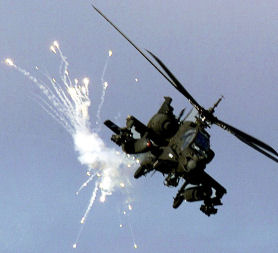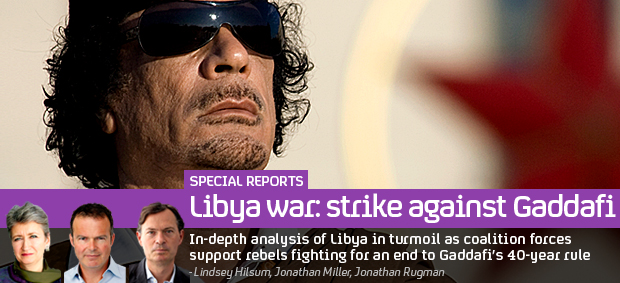Cameron agrees to send Apaches to Libya
Britain steps up its role in Libya by agreeing to deploy four attack helicopters amid claims that the Libyan dictator Colonel Gaddafi is increasingly paranoid and “on the run”.

Prime Minister David Cameron, Defence Secretary Liam Fox and military chiefs have agreed to send four Apache attack helicopters to be used by the NATO operation in Libya.
The Apaches are expected to become operational within days aboard the HMS Ocean, which is currently in the Mediterranean.
They’ll join 12 French Tiger and Gazelle helicopters deployed on the carrier Tonnerre.
The move represents an escalation in the war in Libya and will give the NATO operation the ability to engage close-quarter targets, reducing the potential for collateral damage and allowing a wider range of targets to be taken on. They are expected to be used against Gaddafi’s troops in built-up areas of Misrata.
Earlier, Cameron and French President Nicolas Sarkozy discussed the situation at the G8 summit in France, with both leaders agreeing that the pressure on Gaddafi must be increased.
There had been speculation about the move to deploy them since Monday after France said it would be deploying French Tiger helicopters and the UK would be sending Apaches.
The news came during one of the heaviest periods of NATO bombardment in Libya since operations began on 19 March, with five explosions heard in Tripoli.
The Chief of Defence Staff’s spokesman, Major General John Lorimer, confirmed RAF jets attacked a major military vehicle depot in the Libyan desert.
With Apache helicopters poised to attack Libya, MPs warn the Government it does not have a "blank cheque" to fund the fight against Colonel Gaddafi.
Read more: Apaches mark 'serious' moment in Libya conflict
Meanwhile reports say MI6 has told David Cameron it has discovered that Gaddafi’s behaviour is becoming even more erratic as NATO strikes take their toll.
He is said to be moving between hospitals in the Tripoli area nightly to apparently evade missiles – such as the ones which killed his youngest son last month.
Gaddafi has now not been seen in public since 11 May, and his commanders have apparently stopped using telephones for fear of being overheard.
Libya’s government has called for a ceasefire, but insists Colonel Gaddafi will not step down as the country’s leader.
Prime Minister Al-Baghdadi al-Mahmoudi told reporters he was willing to hold talks with “all Libyans,” including members of the rebel administration based in the eastern city of Benghazi.
But he insisted Gaddafi “is in the heart of every Libyan”.
“If he leaves, the entire Libyan people leave,” he added.
